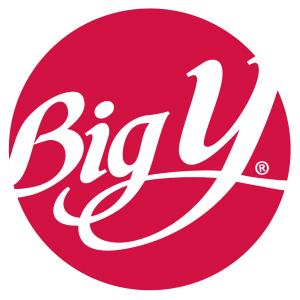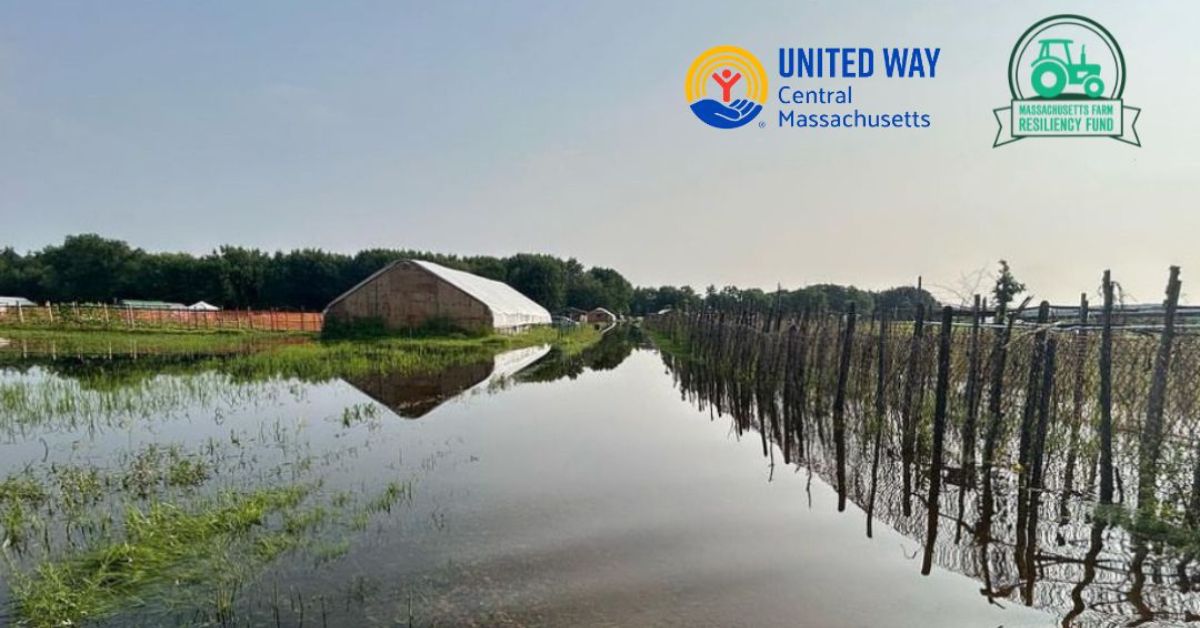36 selections, $3,164
Since September 2023, the Massachusetts Farm Resiliency Fund has been selected to benefit from the Big Y Community Bag Program 36 times at 34 different Big Y locations. In total, the organization has received $3,164 in donations to provide disaster relief funds to farmers in need and enhance climate resilience efforts in Massachusetts.
Tell us about the Massachusetts Farm Resiliency Fund.
If you lived in Massachusetts in 2023, you’ll likely recall it never stopped raining. It rained for 17 out of the 20 weekends during the summer, and during a substantial July storm, the Connecticut River crest brought devastating flooding to hundreds of acres of local farms. The impact was significant to our local farms, which suffered thousands and thousands of dollars in damage, substantial crop loss, and long-term economic hardships. These economic hardships were experienced not only by the farmers themselves but also by the numerous businesses, schools, and food pantries they serve.
When they learned of the devastation to so many local farms, Governor Maura Healey and Lieutenant Governor Kim Driscoll contacted Tim Garvin, the president and CEO of United Way of Central Massachusetts (UWCM). They reached out to Tim to seek his expertise and the historical resilience the UWCM provides to the community.
With the governor and lieutenant governor, UWCM brought together Community Supported and Sustaining Agriculture (CESA) and the Community Foundation of Western Massachusetts to create the Massachusetts Farm Resiliency Fund. In a matter of weeks, we went from simply knowing there was a need to creating the Massachusetts Farm Resiliency Fund and gifting $3.2 million in raised funds to 294 farms.
In a matter of weeks, we went from simply knowing there was a need to creating the Massachusetts Farm Resiliency Fund and gifting $3.2 million in raised funds to 294 farms.
As a group, we were very quick and strategic. Knowing the impact farmers have on our economic stability and food security, we wanted to ensure that we got funds into the hands of farmers who needed it.
The interesting part is that raising $3.2 million set the bar for the state to raise $15 million to continue providing relief to Massachusetts farmers. Most recently, Congress was able to allocate $220 million toward farmers in New England who have been impacted by weather-related catastrophes over the last two years. It is fascinating to see what one act can do to manifest substantial change.
What services do you provide to the community?
Although we intended the Massachusetts Farm Resiliency Fund to be a one-time fund for immediate needs, we recognize that climate resilience and its impact on farming is not going away anytime soon. In fact, we went from catastrophic flooding in 2023 to a catastrophic drought in 2024. As a result, the United Way of Central Massachusetts is looking at community resilience, one of our four pillars for impacting and strengthening our community.
We are not just looking at disaster relief but also ways to mitigate and prevent catastrophic situations from happening in the first place. Farms are vital to our economic well-being, offering employment opportunities and contributing large food donations to local pantries, food banks, and our local school systems. We want to strengthen our relationships with community partners, including investors, volunteers, and donors. If we are united, we can ensure our community is the most resilient it can be.
The Farm Fund is currently closed and will only reopen when the governor, lieutenant governor, or agricultural commissioner says there is a need. We’re now looking at ways to mitigate challenges up front and get ahead of them instead of simply being a disaster relief fund.
Farms are vital to our economic well-being, offering employment opportunities and contributing large food donations to local pantries, food banks, and our local school systems.
How has the Massachusetts Farm Resiliency Fund used the donations from the Big Y Community Bag Program to further its mission?
Once the Massachusetts Farm Resiliency Fund is opened, the funds will be allocated to local farmers in the same manner as in 2023. The need will be at the discretion of the governor, lieutenant governor, and agricultural commissioner.
UWCM recognizes the fact that the need is not going away and is looking at proactive measures to be prepared when disaster relief is needed. Even when the fund is not open, fundraising allows us to respond and act immediately during a time of economic hardship. Since our focus is on disaster relief, this ability to act fast is especially crucial. Weather can be unpredictable, so we have to plan ahead. Extreme drought and rain wreak havoc on farmland, crops, and animals, and economic hardship can be compounding.
Tell us a story about the impact of a program, service, or initiative that the Big Y Community Bag Program has supported.
I’ve only been at the United Way for a year. Before that, I operated and owned a local food hub committed to helping farmers for 12 years. I can tell you with 100% certainty that farmers are the most outside-of-the-box thinkers. I don’t think they’ve ever even seen the inside of the box! They will exhaust any opportunity and are incredibly resourceful.
Farmers can figure out how to persevere through even the most unique challenges. For example, just think about farming in New England! Farming is not something the average person thinks even exists here, given the extreme changes in weather throughout the four seasons and the condition of our farmland, which tends to be riddled with hills and rocks. In the United States, we picture farming as something that happens in the Midwest, California, and Florida, but there is actually an abundance of farms in Massachusetts. In Massachusetts, there are over 7,000 farms. While they are certainly smaller than farms in the Midwest, they provide some of the most amazing products to farm stands, our school systems, hospitals, pantries, and consumers.
After arriving here last year, I read some of the letters from farmers who received financial support from the Massachusetts Farm Resiliency Fund and found that many of them were people I knew and had worked with through my food hub. It was incredibly emotional for me to see what the Massachusetts Farm Resiliency Fund was able to do in a very short amount of time to raise a substantial amount of funds.
There was no red tape involved. Instead, the farmer just registered by giving their name, address, what was impacted, and the extent of the damage. This process basically told anyone applying, “We recognize you’re struggling. We’re going to help you immediately.”
These thank you letters all said how these farmers would not have been able to do it without an immediate cash infusion. Since the flood was in July, it was right in the middle of the growing season. The farmers couldn’t just wait for insurance to catch up. In the footage, you can see one tractor go through rows of corn. Then, 24 hours later, the farmers were in a kayak in the same field because the cornfield was flooded. It was heartbreaking to see the difference between the two images. That visual was just one of hundreds of farms impacted. It really is a moment that pulls at your emotional heartstrings.
To anyone who donates to this program and this fund in particular, we can’t express our gratitude enough. It has a profound impact on real people who are doing incredibly challenging work in our community.
Have you noticed any changes in community awareness or support since becoming involved in the Big Y Community Bag Program?
Generally speaking, any time we are involved in something of that caliber, it helps increase awareness. Big Y isn’t a small-town store; it is a substantial partner that has the ability to touch many people on a daily, or even hourly, basis.
Our chapter of the United Way has been here for 105 years. Until a few years ago, I was completely unaware of what the United Way did. I only understood the United Way from a food security perspective because my small business was a community partner with UWCM.
UWCM is committed to advancing youth opportunities, strengthening financial security, and promoting a healthier and resilient community. We connect resources and people so everyone can thrive. The fact that this program at Big Y helps us get that message out is really important.
We’re not just your grandfather’s nonprofit. We are a nonprofit that has been here through the test of time, seeing many generations and decades. We have 1,800 chapters all over the world, each striving to make sure that every single person in the community thrives. Big Y has played a big role in helping deliver our message to the individual who may not only be interested in volunteering or donating but may even need the services we can connect them to. It all comes full circle, so we’re very thankful for this program and Big Y.
We are a nonprofit that has been here through the test of time, seeing many generations and decades.
What advice would you give other nonprofits participating in the Big Y Community Bag Program?
Just do it! If there’s an opportunity to partner with an organization, do it! The program is a no-brainer. Collaborating and working together is how we build community.

Interview with Lynn Cheney, Vice President of Communications

